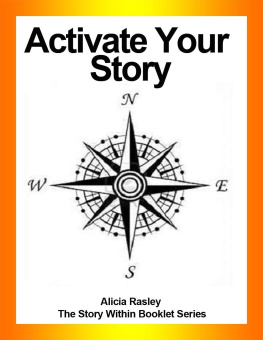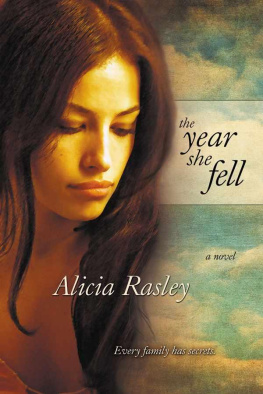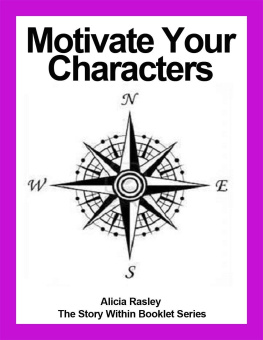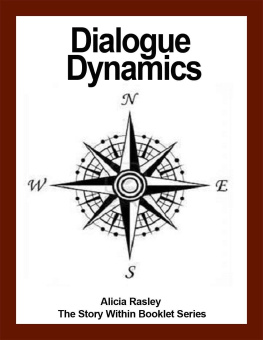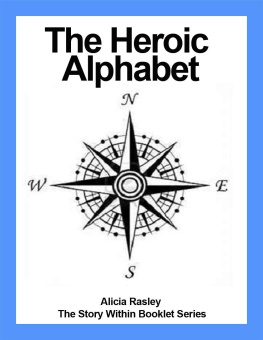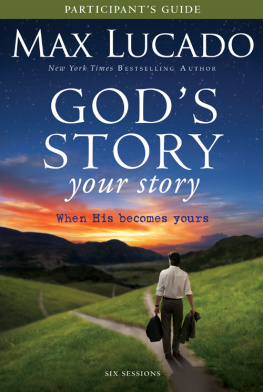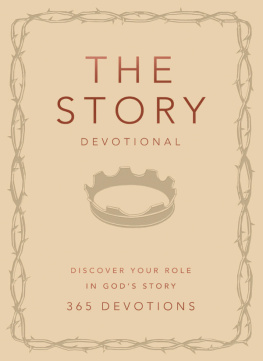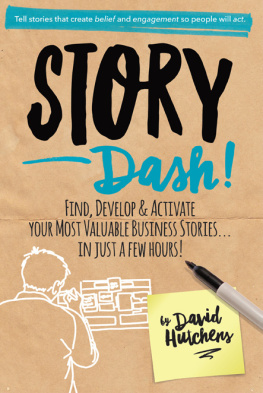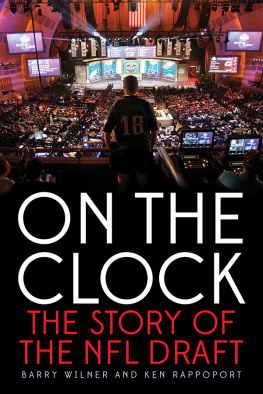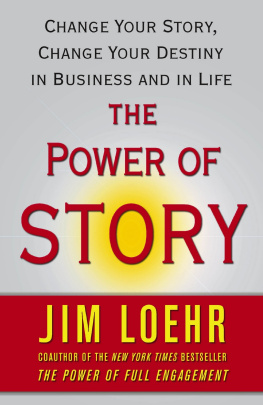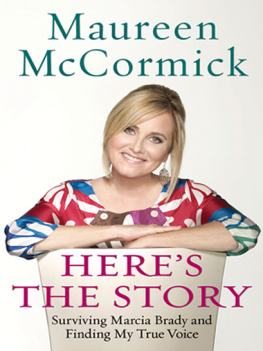Alicia Rasley - Activate Your Story
Here you can read online Alicia Rasley - Activate Your Story full text of the book (entire story) in english for free. Download pdf and epub, get meaning, cover and reviews about this ebook. year: 2014, genre: Art. Description of the work, (preface) as well as reviews are available. Best literature library LitArk.com created for fans of good reading and offers a wide selection of genres:
Romance novel
Science fiction
Adventure
Detective
Science
History
Home and family
Prose
Art
Politics
Computer
Non-fiction
Religion
Business
Children
Humor
Choose a favorite category and find really read worthwhile books. Enjoy immersion in the world of imagination, feel the emotions of the characters or learn something new for yourself, make an fascinating discovery.
- Book:Activate Your Story
- Author:
- Genre:
- Year:2014
- Rating:4 / 5
- Favourites:Add to favourites
- Your mark:
- 80
- 1
- 2
- 3
- 4
- 5
Activate Your Story: summary, description and annotation
We offer to read an annotation, description, summary or preface (depends on what the author of the book "Activate Your Story" wrote himself). If you haven't found the necessary information about the book — write in the comments, we will try to find it.
Activate Your Story — read online for free the complete book (whole text) full work
Below is the text of the book, divided by pages. System saving the place of the last page read, allows you to conveniently read the book "Activate Your Story" online for free, without having to search again every time where you left off. Put a bookmark, and you can go to the page where you finished reading at any time.
Font size:
Interval:
Bookmark:
ACTIVATE YOUR STORY
BY
ALICIA RASLEY
Copyright 2014 by Alicia Rasley
All rights reserved. Midsummer Books, Indianapolis, IN 46220-2182

ACTIVATE YOUR STORY
BY
ALICIA RASLEY
STORY ACTIVATION STARTS WITH ACTIVE CHARACTERS
Here's a disclaimer: My motto is "Never break a sweat." This passivity has occasionally shown up in my writing too. I'm not the sort who automatically thinks to make my characters work too hard, or to keep my readers up at night, or even to make them breathe fast. A few years ago, I turned in a whole complete revised polished manuscript to my editor, who said, "Well, I'll buy this if you put in some action."
"What do you mean," I asked, "action?"
"You know, like a plot. Surely you've noticed that nothing really happens."
Well, I hadn't noticed. When I considered the book in that l ight, I realized she was right; indeed, nothing happened. So I spent three months in hell, making something happen in a book I thought had already happened. See, I thought as long as my prose was active (which it was on occasion), my story was active.
But I' ve learned my lesson, and because I have to work at this, I have some sure-fire tips for fiction-writers who want to activate their story.
The problem for me, and many other writers is, we think of action as adventure, danger, battles-- and steer clear. In fact, action happens when the characters come into confrontation with the plot. It can be as boisterous as a street brawl, or as decorous as a tea party. But in an action scene, the characters do something that furthers the plot, whether it's disarming a nuclear warhead or shopping for an engagement ring.
"Furthering the plot" is the key. Some writers make the mistake editor Leslie Wainger warns against: "Don't try to learn to write action by watching action movies." That results in a string of scenes that are "over-the-top, and even over-er the top," full of pyrotechnics but empty of meaning. But movement isn't action unless it has an effect on the plot.
PASSIVE PROSE--->PASSIVE PLOT
You've all been warned to avoid the passive voice in your prose. Well, passive voice is only a symptom of a larger problem of passive writing. Linguists will tell you that grammar is a culture's first invention, and thus reflects the values and virtues of that culture. Well, you know the English-speaking cultures have been dynamic empire-builders and innovators, and the language reflects that. You can tell by the variety of English verbs describing activities that accomplishment is a value. But some of us manage to create our own sub-grammar, a no-sweat prose that reflects our no-sweat plotting.
If you use vaguish, inactive words and sentences, I bet your plots are sort of vaguish and inactive too. Let's face it, it's a lifestyle, being a passivist. But it's time to reform.
We'll start at the global level-- the plot, and then focus in on narrative and prose.
ACTION-- A DEFINITION
First, let's define action. My favorite definition is by John Barnes, who writes science fiction when he's not studying the history of theater. He looks at action from a theatrical perspective-- and in theater, action is all-important. He calls action "any irreversible event that changes the course of events in the story."
Remember those two factors: Irreversible -- it can't be taken back. So if your heroine writes a love letter and then rips it up, her confession of love isn't an action, because it is reversed. If she puts it in the mailbox, well, it's a federal crime to take it back. That's irreversible.
And the event must change the course of the story. So a big barroom brawl, no matter how active it seems, doesn't count if the only result is that the hero gets his eye blacked.
Let me give you an example of the same event, one real action and one inaction, by this definition. One of Georgette Heyer's popular books, DEVIL'S CUB, opens with the young hero dispatching two bandits. It's clear from his attitude that this doesn't affect him; heck, he doesn't even care enough to move their bodies out of the road. Well, his callousness doesn't make the killings meaningless, far from it. The action, and his reaction, contributes to the next event in the plot. His father hears about this incident and sees it as the final evidence that his son has lost touch with society's values. He exiles Vidal to France, and thus the "meaningless" execution has an unintended effect on the executioner. Indeed, Vidal is propelled into the event in which he meets the heroine and starts his new life.
Now a few years ago, I judged a contest entry that started just like this. That's not plagiarism, you know-- it's homage. We Regency writers always model our first book on some Heyer motif. Anyway, in the first chapter the hero kills two bandits and leaves them in the road and... goes on with another plotline that has him doing other ruthless things before the heroine finally brings him low. Much like the Heyer book. Except... in this case, the execution of the bandits had no effect. It was in there just to show how ruthless he was. To set the tone. To show him in need of redemption. That might be great character description... but it's not action. Action has an effect. It changes the course of events.
Now with that in mind, consider what you as a reader would expect with that opening. The hero dispatches two bandits in Chapter One. Nothing is said about it in Chapter Two, or Three, or Four.... What are you waiting for? The hero ine turns out to be the bandits sister, out for revenge? The hero gets thrown in jail and meets the heroine there? You'd be waiting for something to happen. In Chekhov's famous dictum, you figure that if a gun shows up in Act One, it better go off by Act Three.
That's because you as a reader understand that action is all about cause and effect. Actions have causes-- the bandits attacked the carriage, and the hero keeps a pistol in his pocket, so the killings aren't unexpected. But actions also have effects. They echo somehow in the plot. They come back to haunt you.
You as a writer have to have the same understandin g. Actions not only have causes; they have effects.
CAUSE AND EFFECT CHARACTERS
You don't need to tell me how hard that is. Gosh, I don't even allow guns in my books, much less ruthless executions. And my heroes don't leave litter in the street, much less dead bandits. And as far as stern fathers and rebellious sons, well, I like them to make up quickly before they say something they'll both regret.
The problem is, we are in the business of making characters do today what we know tomorrow they'll probably regret... especially after they see what we've got in store for them.
So... how do you make this happen? Well, from the pers pective of a reformed passivist, I realize it all starts with character. We have to create characters who are capable of action, and who have reason to act. And the reason must be strong enough to make them act in ways they've never acted before. They have to have cause to make intemperate remarks, to commit impulsive acts, to change in unexpected ways.
This doesn't mean that they act in stupid and unmotivated ways... only that they act, and that their actions have an effect. The main character of a book is called the protagonist-- proto-agonist = prime actor-- for a good reason. The ACTOR acts. He or she commits the actions that propel the plot.
ACTIVATING YOUR CHARACTERS
First let's start with character s who are capable of action. This seems too simple to have to say out loud, but I'm going to say it anyway. The protagonist should matter to the story. She should be involved in the main action of the story.
Font size:
Interval:
Bookmark:
Similar books «Activate Your Story»
Look at similar books to Activate Your Story. We have selected literature similar in name and meaning in the hope of providing readers with more options to find new, interesting, not yet read works.
Discussion, reviews of the book Activate Your Story and just readers' own opinions. Leave your comments, write what you think about the work, its meaning or the main characters. Specify what exactly you liked and what you didn't like, and why you think so.

